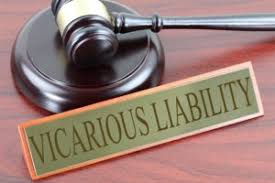
Week 5-6 Kinds of Liabilities
Different modes of Vicarious Liabilities 2. Vicarious Liability arising out of special relationship 3.Liabiloty arising out of Abtment 4. Liability arising out authorisation or subsequent ratification
A PERSON may be liable in respect of wrongful acts of , another in three ways : (i) as having ratified the particular act; (ii) as having stood in some relation with the other so as to entail responsibility for the torts committed by that person ; and (iii) as having abetted the tortious acts committed by others. I. An act done by a person not assuming to act for himself, but for such other person, though without any precedent authority whatever, becomes the act of the principal if subsequently ratified by him . Omnis ratihabitio retrotrahittir, et mandate priori equiparatur (every ratification is retrospective and is of equal force with a previous command). This maxim is not confined to contracts only, it applies to torts as well . The principal is bound by the act, whether it be for his detriment or his advantage, to the same extent as if the act was done by his previous authority. Only such acts bind a principal by subsequent ratification as were on his behalf. Liability for wrongful acts also arises from the relation existing between master and servant, or owner and independent contractor, or principal and agent, or company and director, or firm and partner, or guardian and ward, or lastly, husband and wife. The relation between master and servant gives rise to the liability (i) of master to third persons, (2) of servant to third persons, (3) of master to servants, and (4) of servant to master, (i). A master is liable to third persons for every such wrong of his servant as is committed in the Master's liability although the master did not authorize, or was not cognisant of, or had even expressly forbidden the act or omission in question (Barwick v. English Joint Stock Bank). But a master is not liable for the torts of his servant in any matter beyond the scope of the employment, even if done for his benefit, unless he has expressly authorised them to be done. If the true character of the act of the servant be that it was an act of his own, and done in order to effect a purpose of his own, the master is not liable for it.
Recommended Cases
Ryland v. Fletcher 1868
Century Insurance Co v. North etc 1942
Gregory V. Piper 1900
Williams v. Jones 1965
PLD 1960 PESH. 70.
PLD 1961 SINDH 24.
PLD 1960 Lah. 1184



